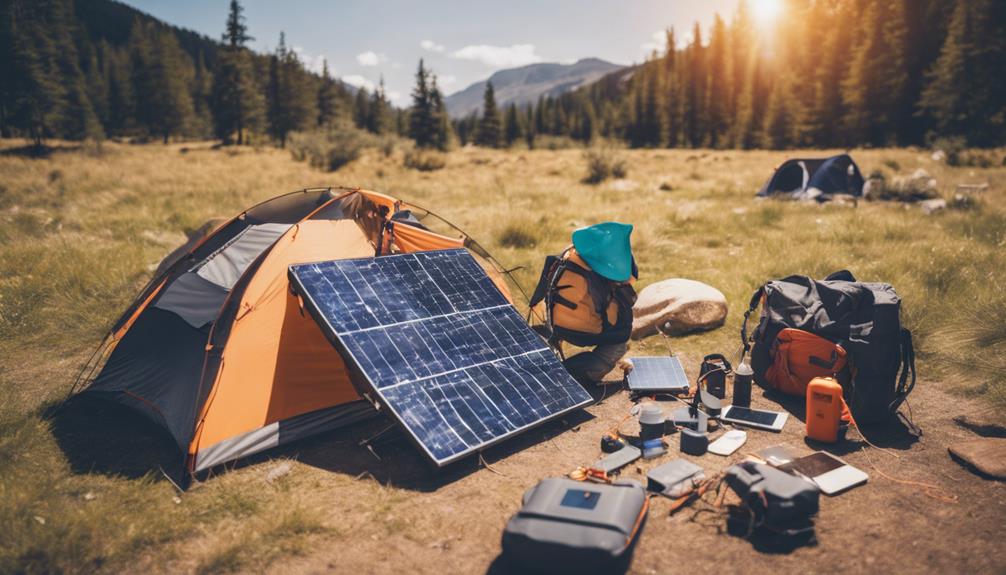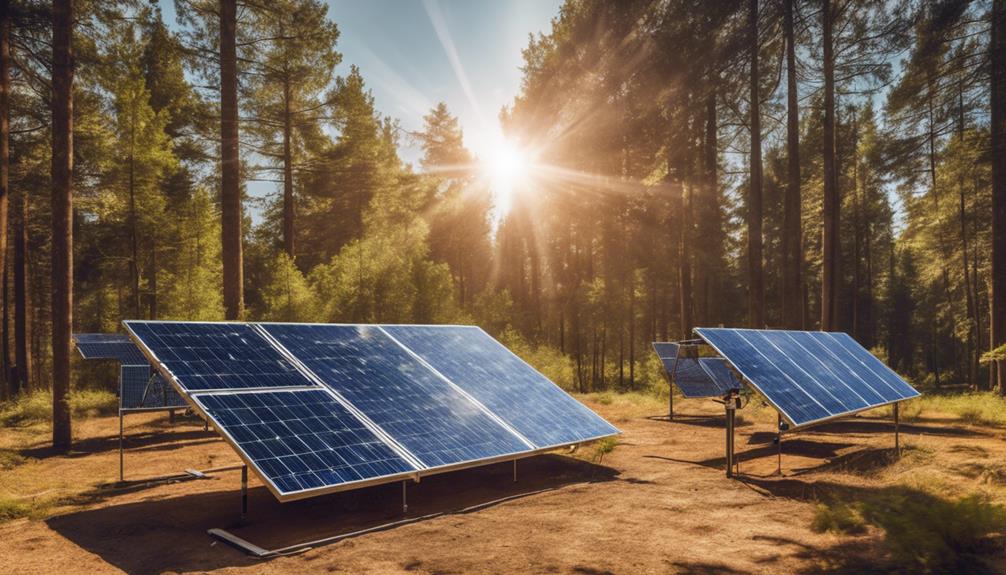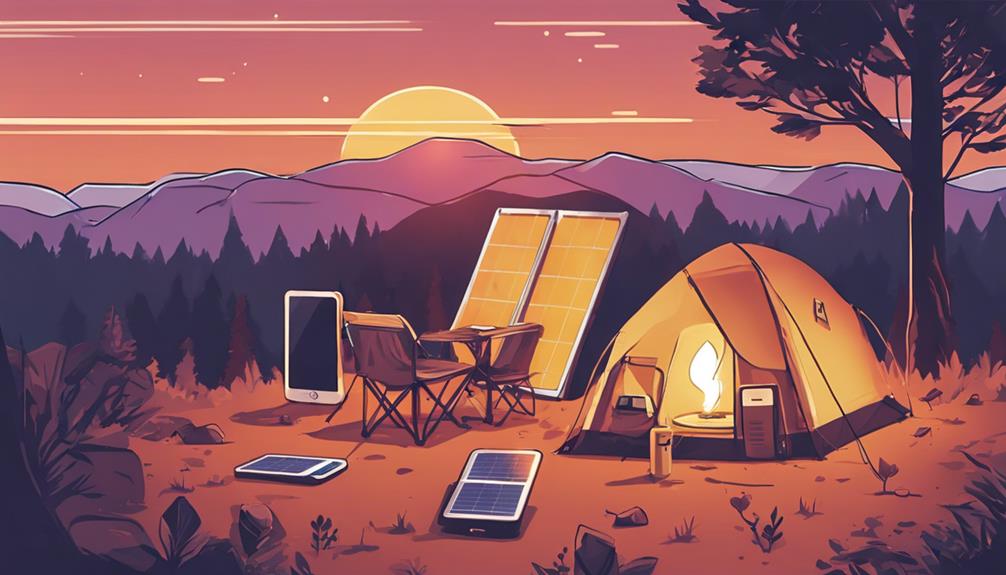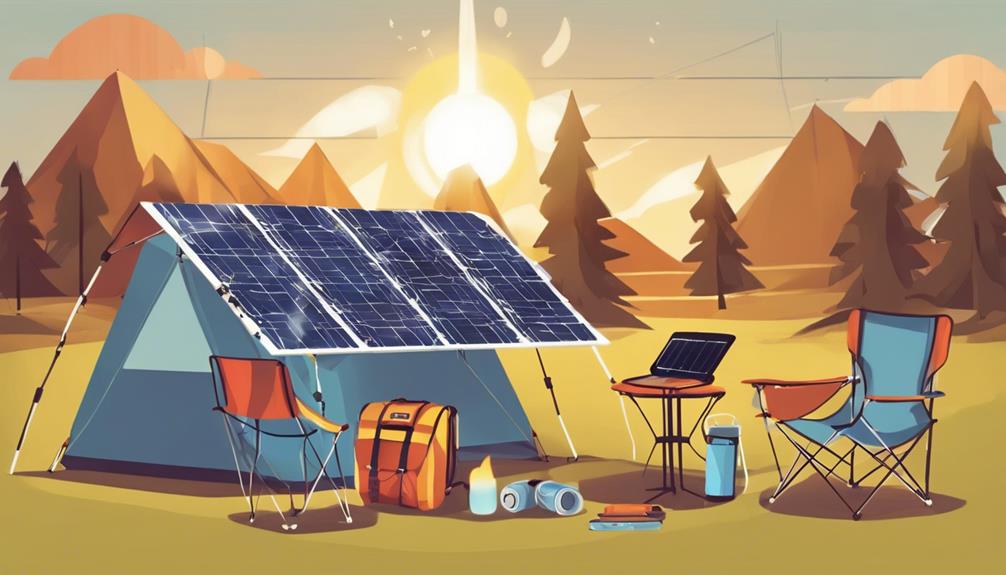When camping, rely on solar panels for power. Choose high-efficiency, portable panels for easy setup. Position them to soak up sunlight, tilt them for max absorption. Connect devices during peak sun hours, and monitor charging progress. Store excess energy using deep-cycle batteries for night use. Invest in a charge controller for battery protection. Now you're all set for a powered-up camping trip!
Choosing the Right Solar Panels

When selecting solar panels for your camping needs, consider the wattage output and portability to guarantee they meet your power requirements while being easy to transport.
Solar panel efficiency is essential, as it determines how well the panels convert sunlight into electricity. Look for panels with a high efficiency rating to ensure maximum power generation.
When deciding between portable and fixed panels, think about your camping style. Portable panels are lightweight and easy to set up, making them ideal for campers who frequently move around or need to adjust the panel angle for best sunlight exposure.
On the other hand, fixed panels are more permanent installations that can be mounted on your RV or camper van. They're typically more durable and require less hands-on adjustment but may not offer the same level of flexibility as portable options.
Ultimately, the choice between portable and fixed panels depends on your camping preferences and power needs. Consider factors like convenience, ease of use, and the amount of power you require when making your decision.
Setting Up Your Solar System
Consider the layout of your camping site before setting up your solar system to guarantee optimal sunlight exposure for peak power generation. Start by positioning your solar panels in a location where they'll receive direct sunlight for the longest part of the day. Ideally, aim for a south-facing orientation in the northern hemisphere or a north-facing orientation in the southern hemisphere to capture the most sunlight. Avoid shading from trees, buildings, or other obstructions that could hinder the efficiency of your panels.
When setting up your solar system, make sure that your battery capacity matches the energy requirements of your camping activities. Calculate the total wattage needed to power your devices and appliances, then choose a battery with sufficient capacity to store that energy. A larger battery capacity will allow you to store excess energy generated during the day for use at night or during cloudy weather.
Proper solar panel positioning and the right battery capacity are essential for maximizing the efficiency and effectiveness of your camping solar system.
Maximizing Sunlight Exposure

Position your solar panels to receive direct sunlight for the longest duration to maximize power generation efficiency during your camping trip. When setting up your portable solar chargers, consider the angle at which the sunlight hits the panels.
The ideal solar panel angle varies depending on your location and the time of year. As a general rule of thumb, in the northern hemisphere, tilt the panels towards the south for maximum sunlight exposure. Similarly, in the southern hemisphere, face them north. Adjusting the tilt of your solar panels throughout the day can further optimize sunlight absorption.
Ensure there are no obstructions casting shadows on the panels, such as trees or tents. Regularly check the positioning of your solar panels to track the sun's movement and make necessary adjustments.
Charging Devices With Solar Power
To effectively charge your devices using solar power while camping, make certain your solar panels receive direct sunlight and are positioned efficiently throughout the day.
When using portable chargers or energy-saving devices, it's crucial to consider their power consumption and battery life to enhance the charging process. Start by connecting your devices to the solar panels during daylight hours when the sun is at its peak intensity for maximum efficiency.
Energy-saving devices can help extend battery life, allowing you to charge multiple devices without draining the power source quickly. Make sure that your portable chargers are compatible with solar panels and have the necessary input requirements to charge effectively.
Monitor the charging progress throughout the day to adjust the positioning of the solar panels for optimal sunlight exposure.
Storing Energy for Night Use

Harnessing solar energy during the day for night-time use can be achieved by efficiently storing the generated power in batteries. To guarantee a seamless camping experience, proper battery management is vital. Opt for deep-cycle batteries designed for renewable energy systems, as they can endure repeated charging and discharging cycles.
Calculate your power consumption needs based on the nighttime activities you plan to engage in – whether it's running LED lights, charging devices, or using small appliances.
Maintaining energy efficiency is crucial for maximizing the stored power. Consider investing in a charge controller to prevent overcharging and prolong battery life. Additionally, using energy-efficient appliances can help conserve power for extended use during the night.
Prioritize essential devices and avoid unnecessary power consumption to make the most of your stored energy.
Maintaining and Troubleshooting Tips
Proper maintenance of your solar panels and batteries is vital to guarantee peak performance during your camping trips. Begin by regularly cleaning your panels to remove dirt, dust, and debris that can block sunlight absorption.
Check connections between panels, charge controllers, and batteries to make sure they're secure and free of corrosion. Testing your battery periodically is necessary to ensure it holds a charge efficiently. Inspect wiring for any signs of wear or damage, such as fraying or exposed wires, as this can lead to power loss or safety hazards.
When troubleshooting issues, start by checking the charge controller to confirm it's functioning correctly. Verify that all cables are connected properly and that there are no loose connections. If your system isn't charging as expected, examine the battery health and consider replacing it if necessary.
Should you encounter persistent problems, consult the user manual or reach out to customer support for further assistance. By following these maintenance and troubleshooting tips, you can optimize the performance of your solar panels and enjoy reliable power during your camping adventures.
Frequently Asked Questions
Can Solar Panels Charge Devices in Cloudy Weather?
Yes, solar panels can charge devices in cloudy weather. To optimize this, guarantee proper solar panel maintenance and consider higher efficiency panels. Cloudy days reduce energy production, but with care, you can still charge your devices.
How Do I Prevent Theft of My Solar Panels While Camping?
To prevent theft of your solar panels while camping, implement security measures like locks and alarms. Camouflage panels to blend with surroundings. These steps will deter potential thieves and protect your equipment.
Are There Portable Solar Panels for Backpacking Trips?
When backpacking, consider portable solar panels. Look for high solar panel efficiency to charge devices faster. Opt for lightweight models to ease your load. Confirm they can withstand rugged conditions for reliable power.
Can I Use Solar Panels in Cold or Snowy Conditions?
In winter camping, using solar panels in snowy conditions can be challenging. Confirm panels are angled to catch sunlight, regularly clear off snow, and use insulated battery banks to maintain power in cold weather.
What Is the Average Lifespan of Portable Solar Panels?
Portable solar panels typically last 25-30 years with proper maintenance. Regularly clean panels, check for damage, and store correctly to maximize lifespan. When it's time to replace, recycle panels at designated facilities for eco-friendly disposal.
Conclusion
Overall, using solar panels for camping can greatly enhance your outdoor experience by providing a reliable and renewable source of energy.
By choosing the right panels, setting up your system properly, maximizing sunlight exposure, and efficiently charging devices, you can enjoy the benefits of solar power while on the go.
Remember to also store energy for nighttime use and perform regular maintenance to guarantee your solar system continues to work effectively during your camping adventures.
